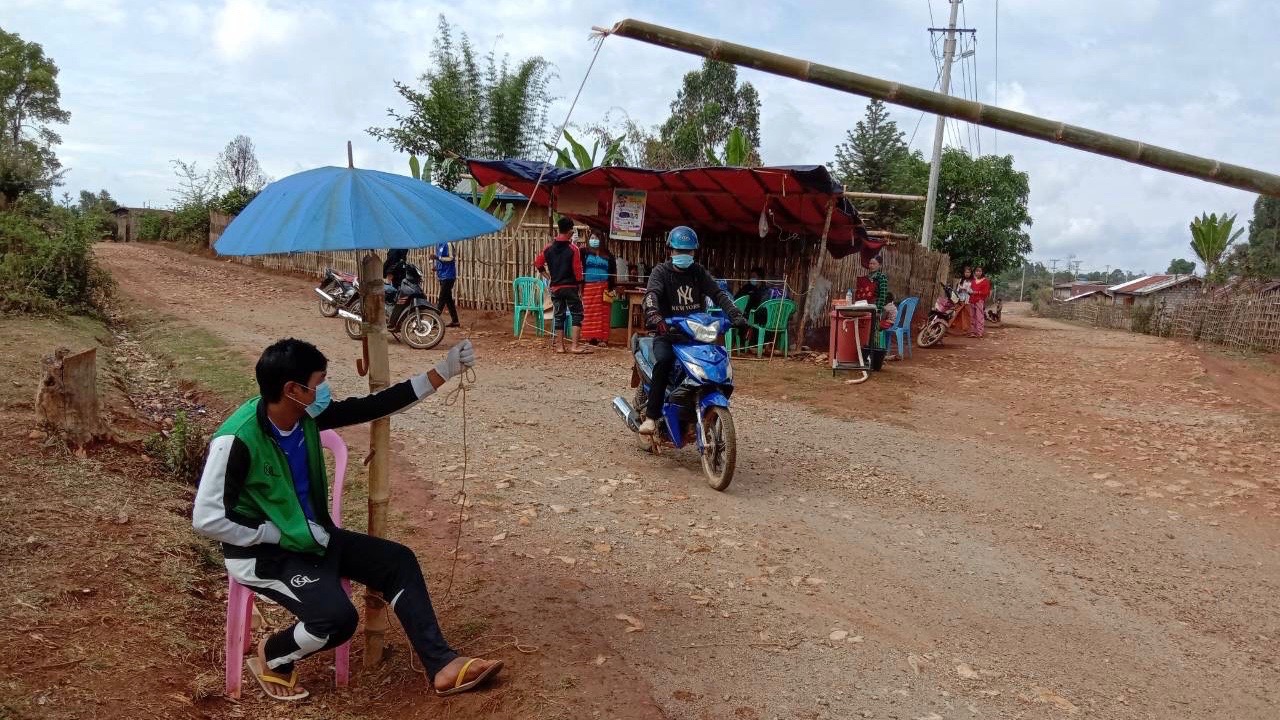|
|
|
ကိုဗစ္-၁၉သည္ မည္သည့္ေန႔ရက္တြင္ ကူးစက္ပ်ံ႕ႏွံ့မႈရပ္တန႔္ၿပီး ပုံမွန္အေျခအေနဆီ ျပန္ေရာက္နိုင္မည္ဟု မည္သူကမၽွမေျပာနိုင္ပါ။ ေမၽွာ္လင့္ထားၾကေသာ အေျခအေနသစ္ (New Normal) ထဲသို႔ ေရာက္မည္ႀကံဆဲတြင္ပင္ ေရာဂါကူးစက္မႈမ်ားလာေသာေၾကာင့္ ေနာက္ျပန္ဆုတ္ ရျခင္းမ်ား ရွိေနျမဲပင္ ရွိေသးသည္။
Hitting where it hurts: Impacts of COVID-19 measures on Myanmar poor
A Commentary by Nwet Kay Khine
|
|
 A community-based health check gate for COVID-19 prevention A community-based health check gate for COVID-19 prevention |
|
|
|
|
In a country that was ruled by dictatorship for several decades, the local administration units are also no stranger to emergency-like authoritarian measures. Many thought there is no option but detention to deal with the situation. It is easier for the authorities even at the village and ward levels to ensure authoritarian submission if the country is in panic.
As it is impossible to put a date on when the COVID-19 will end, unprecedented setbacks within the “new normal” period are likely to happen any time. To prevent a higher risk of transmission, the government agencies are making sure that punishment mechanisms for non-compliance are functioning. However, random law enforcement measures can give confusing signals and may directly and indirectly increase the economic pressure on the poor. That is why all stakeholders who are involved in law enforcement processes must be aware of the core principles reflected in the UN implementing guidelines on emergencies, namely “legality, necessity, proportionality and non-discrimination”.
|
|
|
|
|
These commentaries are intended to contribute to a broader understanding to the many challenges facing the country and its peoples.
See the complete list of all the Myanmar commentaries.
|
|
|
|
|
တစ္ပူေပၚ ႏွစ္ပူဆင့္ခဲ့ေသာ ျမန္မာ့ ေအာက္ေျခလူတန္းစားမ်ား
ေဒါက္တာႏြဲ႕ေကခိုင္
|
|
 ရပ္ရြာအေျချပဳ ကိုဗစ္-၁၉ ေရာဂါကာကြယ္တားဆီးေရးစစ္ေဆးေရးဂိတ္တစ္ခု ရပ္ရြာအေျချပဳ ကိုဗစ္-၁၉ ေရာဂါကာကြယ္တားဆီးေရးစစ္ေဆးေရးဂိတ္တစ္ခု
|
|
|
|
|
| |
အာဏာရွင္စနစ္ေအာက္တြင္ ဆယ္စုႏွစ္ေပါင္းမ်ားစြာ အသားက်ေနေသာ နိုင္ငံတစ္ခု အေနႏွင့္ ကိုဗစ္ကဲ့သို႔ေသာ အေရးေပၚကာလတြင္ အာဏာစက္ကို လြန္လြန္ကဲကဲသုံးေသာ ေဒသႏၲရ အုပ္ခ်ဳပ္ေရးမ်ိဳးမ်ားသည္လည္း မရွားလွပါ။ ဤကဲ့သို႔ ကပ္ေဘးအႏၲရာယ္မ်ိဳးကို ကိုင္တြယ္ရခ်ိန္တြင္ ေထာင္ခ်ရျခင္း၊ ခ်ဳပ္ေႏွာင္ရျခင္းကလြဲၿပီး အျခားနည္းမရွိဟု ယူဆခဲ့ၾကသည့္ အမႈမ်ား မ်ားစြာပင္ ရွိသည္။ ေက်းလက္မ်ားအပါအဝင္ ေနရာေတာ္ေတာ္မ်ားမ်ားတြင္ လူအမ်ား အထိတ္တလန႔္ စိုးရိမ္ေနေသာအခ်ိန္တြင္ အာဏာပိုင္မ်ားႏွင့္ ဆက္စပ္အဖြဲ႕အစည္းမ်ားသည္ ျပည္သူကို အာဏာျဖင့္ ၿငိမ္ဝပ္ေအာင္ လုပ္ရန္ပိုၿပီးလြယ္ကူခဲ့ၾကသည္။
ကိုဗစ္-၁၉သည္ မည္သည့္ေန႔ရက္တြင္ ကူးစက္ပ်ံ႕ႏွံ့မႈရပ္တန႔္ၿပီး ပုံမွန္အေျခအေနဆီ ျပန္ေရာက္နိုင္မည္ဟု မည္သူကမၽွမေျပာနိုင္ပါ။ ေမၽွာ္လင့္ထားၾကေသာ အေျခအေနသစ္ (New Normal) ထဲသို႔ ေရာက္မည္ႀကံဆဲတြင္ပင္ ေရာဂါကူးစက္မႈမ်ားလာေသာေၾကာင့္ ေနာက္ျပန္ဆုတ္ ရျခင္းမ်ား ရွိေနျမဲပင္ ရွိေသးသည္။ ျမင့္မားလာနိုင္သည့္ ကူးစက္မႈကို ကာကြယ္ေရးအတြက္ အစိုးရ အဖြဲ႕အစည္းမ်ားသည္ လူအမ်ားစည္းကမ္းလိုက္နာမႈကို ႀကီးၾကပ္ရန္ ျပစ္ဒဏ္စနစ္မ်ားကို က်င့္သုံး ေနၾကရေပဦးမည္။ သို႔ရာတြင္ မခ်ိန္မဆဘဲ အျပစ္ေပးေသာ ျဖစ္စဥ္မ်ားတြင္ မရွင္းလင္း မလုံေလာက္ပါဘဲ အာဏာကို သုံးစြဲၾကခ်ိန္တြင္သာ အျပစ္ရရန္ ေသခ်ာေရရာေနျခင္းမ်ားေၾကာင့္ ဆင္းရဲႏြမ္းပါးသူမ်ားရင္ဆိုင္ရသည့္ ဝန္ထုတ္ဝန္ပိုးမ်ား ပိုမႀကီးလာေစသင့္ပါ။ သို႔ျဖစ္ရာ တရားဥပေဒစိုးမိုးေရးဘက္တြင္ ပါဝင္ေဆာင္ရြက္ေနၾကသူ အေပါင္း တို႔သည္ အေရးေပၚကာလအတြင္း ကုလသမဂၢက ခ်မွတ္ထားေသာမူမ်ား - တရားဥပေဒႏွင့္ အညီ မၽွတစြာ စီရင္ျခင္း၊ မျဖစ္မေနလိုအပ္ေၾကာင္း ေသခ်ာမွသာ အာဏာကိုသုံးျခင္း၊ ႀကီးသည့္အမႈ ႀကီးသလို ငယ္သည့္အမႈကို ငယ္သလို သင့္တင့္စြာ စီရင္တတ္ျခင္း၊ အဂတိမပါဘဲ ခြဲျခားဆက္ဆံမႈ ကင္းျခင္း စသည္တို႔ကို မျဖစ္မေန ထည့္သြင္း ျပင္ဆင္ကာ က်င့္ႀကံၾကရန္ အေရးႀကီးလွပါသည္။
|
|
|
|
|
|
|
|
|
| |